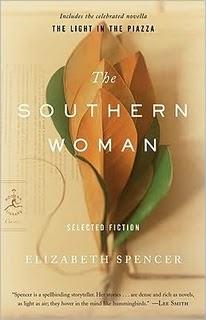The Southern Woman

I grew up in the so-called New South, where there are sweet tea and skyscrapers, Gone with the Wind screenings in posh movie theaters, and Faulkner reading groups, but no stereotypical southern drawl and no cornbread. In an age where regional identity yields to interstates and chain hotels, can I still call myself a southern woman? After reading Elizabeth Spencer’s collection of short stories, I think I can.
Spencer’s South is not just a location; it is a kind of voice, a way of thinking and of speaking. “She was one of the old school of Southern lady talkers,” Spencer writes of one of her characters. “She tried to protect you from even a moment of silence.” So goes the conversation of Mrs. Harvey in “First Dark,” a story about a well-to-do Mississippi socialite struggling to come to terms with her daughter’s undistinguished suitor. In a volume that shifts from the bayous of Biloxi to the piazzas of Florence, voice, as much as setting, becomes the guiding force of Spencer’s fiction. Nearly all of her protagonists are women, and their voices—funny, shocking, anguished, and strange—propel the reader through story after story.
The Southern Woman is split into four sections: “The South”; “Italy”; “Up North”; and “New Stories.” Many of the stories in “The South” deal with rural landscapes, religious orthodoxy, and the legacy of slavery. In “Sharon,” a young girl first learns of the relationship between her White uncle and his Black housekeeper. Sexual awakening is the theme of the sultry “Ship Island,” about a girl from a poor family coming of age among Marine Club boys, eccentric millionaires, and a raucous adult Bible class. Spencer’s heroines are never dull; they break horses and chase ghosts through small towns and back roads.
The narrators in The Southern Woman often wrestle with family conflicts, and stories across all of Spencer’s geographies feature runaway relatives, errant husbands, and anxious parents. One of the most touching pieces in the collection, the novella “The Light in the Piazza,” tells the story of an American woman, Margaret Johnson, who brings her daughter Clara to Florence. Clara is permanently brain damaged from a childhood accident, and when she falls in love with a young Italian man, her mother learns to see her daughter as an adult for the first time: “a warm, classical dignity had come to this girl,” her mother realizes, “and no matter whether she could do long division or not, she was a woman.”
Spencer is not afraid to take risks in her writing, with mostly superb results. In some of the stories, particularly “The Business Venture” and “The Cousins,” the narrator’s voice is so intimate it becomes almost cloying. Spencer’s quirky characters are fascinating when they waver between the real and the fantastic. “The Finder” tells the tale of a man with a supernatural ability to find all lost things everywhere, and “I, Maureen” tells the story of a woman whose life changes after she experiences a vision in a flying piece of glass. Both of these stories exemplify Spencer’s dreamlike sense of comedy—a humor that both laughs and thinks.
Whether strolling through Southern farmlands or European squares, Spencer’s characters are fresh, funny, thoughtful, and, above all, honest. You’ll find someone to like in The Southern Woman, no matter how regional—or region-less—you are.
As a "southern" girl from Austin, I would love to read this. Great review.
Excellent review. Sounds like a great read!